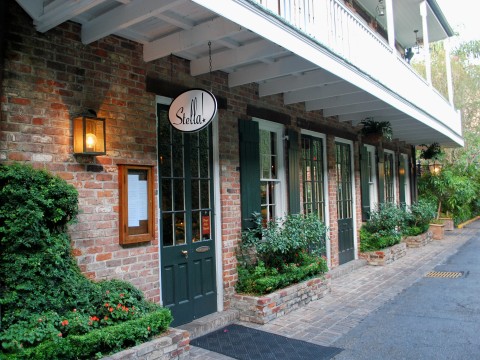[dropcap1]I[/dropcap1] have been reading a book in which the ancient Greek philosopher Epicurus figures strongly. If I may be permitted by the academics in the audience to oversimplify, Epicurus and his followers believed that happiness is a worthwhile goal for humans. Particularly in a world where so many philosophies insist that we should seek and embrace suffering.
I was thinking about this when the news came down of the closing and bankruptcy filing of Chef Scott Boswell's restaurant entities. In this, flagship restaurant Stella! passed from the scene suddenly last week, with even the employees taken by surprise.
Restaurants open and close a lot. If this were New York or the West Coast, Stella's closing would have been noted briefly. Then everyone would move on to the next hot restaurant. But the New Orleans market is noteworthy (and much preferable) for its stability and lack of frequent, major shutterings.
Stella! got top ratings from everybody, including all the local food writers and nearly all of their readers. For it to exit the scene says that something else in the broader view is off kilter.
[dropcap1]B[/dropcap1]oswell was the product of a brief but intense star-forming collusion in the 1990s. He, John Besh, and Bingo Starr worked at the Windsor Court Grill Room during its glowing Kevin Graham years--the all-time high point for that then-influential restaurant. It was also a time when a few other chefs began tasting the upper limits of what could be done in a restaurant kitchen. We began seeing some truly exotic and expensive ingredients, prepared in fanciful ways that made even a well-read foodie look to his Larousse Gastronomique to understand the menu. Just about all of these experiments failed, even though a lot of memorable food came from them. One holdback was pricing, which reached levels few diners found comfortable. Another was the mysteriousness of some ingredients.
None of these assaults on the upper end succeeded. But the chefs involved--many just beginning their careers--kept the idea in the backs of their minds. Boswell opened Stella! as an excellent but non-revolutionary gourmet bistro. His menu was original but understandable, his prices up there but far from the top of the chart.
Just as Stella! hit its stride, Katrina came through. Boswell's response to the disaster was inspired, starting with hamburgers and sausages on a charcoal grill in Stella!'s courtyard, then moving through the riverside wall to open a different, casual, temporary breakfast-and-lunch place. It would evolve into Boswell's second restaurant, Stanley. Stanley was an enormous hit in the months after the storm, and generated so much good will that Boswell opened a permanent Stanley in the Lower Pontalba--about as ideal a location as could be imagined for the concept.
It was a long time before Stella! reopened as it had been before. But it wasn't long before Boswell raised his ambitions to those he remembered from a few years earlier. To make a long story short, the chef's tasting menu became more or less the only menu. Almost immediately, the food press--both local and national--was in the thrall.
[dropcap1]S[/dropcap1]tella! was a year down that road when I finally made it there for dinner. It was everything I mean when I give a restaurant my top rating. The menu was fascinating, requiring discussion with the waiter. He knew the answers to all my questions, including those on obscure fine points. The sommelier offered a pairing of wines with all nine courses. His choices were brilliant, and included several wines I'd only read about before.
This dinner is among the most memorable in my long experience. It still holds the record for my most expensive local dinner at $285. I thought it was worth every dime, and I would do it again, if not often.
[caption id="attachment_38205" align="alignnone" width="267"] Scott Boswell, in happier times.[/caption]
Probably because everything else was ideal, I remember two minor imperfections in this dinner at Stella!. First was the reaction of four young men dining at an adjacent table. The waiter's extensive descriptions of the food made them laugh. Politely--this was obviously terra incognita for these guys, and it made them nervous. I felt bad both for them and the waiter.
The second wrinkling of my brow came from the 100-year-old balsamic vinegar in one of the dishes. For obvious reasons, there's only a limited supply of this, and with more chefs looking for ingredients with advanced pedigrees, the demand is rising. So only a single drop of the precious brown liquid came, right there in the middle of the plate. I wiped up the drop with my finger and tasted it alone. It was not there for it's taste, that's for sure. It was just something to talk about. And people did talk about it, in the same way that baked Alaska was talked about in its day. I guess that's okay.
[caption id="attachment_38592" align="alignnone" width="400"]
Scott Boswell, in happier times.[/caption]
Probably because everything else was ideal, I remember two minor imperfections in this dinner at Stella!. First was the reaction of four young men dining at an adjacent table. The waiter's extensive descriptions of the food made them laugh. Politely--this was obviously terra incognita for these guys, and it made them nervous. I felt bad both for them and the waiter.
The second wrinkling of my brow came from the 100-year-old balsamic vinegar in one of the dishes. For obvious reasons, there's only a limited supply of this, and with more chefs looking for ingredients with advanced pedigrees, the demand is rising. So only a single drop of the precious brown liquid came, right there in the middle of the plate. I wiped up the drop with my finger and tasted it alone. It was not there for it's taste, that's for sure. It was just something to talk about. And people did talk about it, in the same way that baked Alaska was talked about in its day. I guess that's okay.
[caption id="attachment_38592" align="alignnone" width="400"] Egg and caviar at Stella. Think about it.[/caption]
But as time went on, Stella!'s menu seemed to be more about ingredients with long, interesting stories and less about enjoyability. That started with Emeril during his Commander's Palace days. He placed a new emphasis on locally-produced foodstuffs, and he made many formerly store-bought ingredients in house. He wasn't the only one, but he was the most prominent and influential.
[dropcap1]A[/dropcap1] lot of the chefs who buy predominantly local foods or who make their own salumi, Worcestershire sauce, or pasta really do have better food as a result. But the ingredients may cost more, and perhaps much more. Small producers almost always charge more than mega-farms, and the extra man-hours make sausage or cheese in the restaurant are not free.
But that's not what worries me. It's the reliance upon these hip new ingredients to make up for a decline in taste and--in the worst cases--a lack of skill in the kitchen.
I talk to chefs all the time, and I cringe when I hear them describe their dishes. They rattle off the impressive ingredients, identifying where they came from and why this particular sub-species is special, or how many days the things were cured or aged. This can go down to the most insignificant flecks of seasoning in the recipe. The more interesting the story about an ingredient's provenance, the more it is emphasized.
But it is not true that great ingredients per se add up automatically to a delicious plate of food. That is a central tenet of professional cooking today. But I've had too many counter-examples put before me to believe it.
[dropcap1]C[/dropcap1]hef Scott Boswell played the ingredients game very well, and his food was never less than excellent. But as those four young guys demonstrated, ingredients so rare as to be outside the experience of all but a few gourmets and food writers--and very expensive to serve--alienate a lot of customers.
On top of that, it has become clear that the day of the formal restaurant is drawing to a close worldwide. When Lucas Carton--a longtime Michelin three-star gourmet house in Paris--gave up its career as a top-end restaurant in favor of becoming more like a bistro, we knew that few grand fine-dining restaurants would survive.
But that's the arena in which the ingredients game is played! And restaurants with high prices suggest a level of environment, service and wine cellar few restaurants can afford. So they're trapped. This is what happened to Stella! Sometimes you can do everything just right and still lose.
[dropcap1]I[/dropcap1]t might be said that New Orleans should have at least a few restaurants like Stella!. Maybe so, but there ought to be shoulders on the Causeway, a train to Baton Rouge, and a professional repertory theater in town. The lack of customers willing to pay the bills on those boons makes them all fantasies, regardless of their quality.
[caption id="attachment_42601" align="alignleft" width="480"]
Egg and caviar at Stella. Think about it.[/caption]
But as time went on, Stella!'s menu seemed to be more about ingredients with long, interesting stories and less about enjoyability. That started with Emeril during his Commander's Palace days. He placed a new emphasis on locally-produced foodstuffs, and he made many formerly store-bought ingredients in house. He wasn't the only one, but he was the most prominent and influential.
[dropcap1]A[/dropcap1] lot of the chefs who buy predominantly local foods or who make their own salumi, Worcestershire sauce, or pasta really do have better food as a result. But the ingredients may cost more, and perhaps much more. Small producers almost always charge more than mega-farms, and the extra man-hours make sausage or cheese in the restaurant are not free.
But that's not what worries me. It's the reliance upon these hip new ingredients to make up for a decline in taste and--in the worst cases--a lack of skill in the kitchen.
I talk to chefs all the time, and I cringe when I hear them describe their dishes. They rattle off the impressive ingredients, identifying where they came from and why this particular sub-species is special, or how many days the things were cured or aged. This can go down to the most insignificant flecks of seasoning in the recipe. The more interesting the story about an ingredient's provenance, the more it is emphasized.
But it is not true that great ingredients per se add up automatically to a delicious plate of food. That is a central tenet of professional cooking today. But I've had too many counter-examples put before me to believe it.
[dropcap1]C[/dropcap1]hef Scott Boswell played the ingredients game very well, and his food was never less than excellent. But as those four young guys demonstrated, ingredients so rare as to be outside the experience of all but a few gourmets and food writers--and very expensive to serve--alienate a lot of customers.
On top of that, it has become clear that the day of the formal restaurant is drawing to a close worldwide. When Lucas Carton--a longtime Michelin three-star gourmet house in Paris--gave up its career as a top-end restaurant in favor of becoming more like a bistro, we knew that few grand fine-dining restaurants would survive.
But that's the arena in which the ingredients game is played! And restaurants with high prices suggest a level of environment, service and wine cellar few restaurants can afford. So they're trapped. This is what happened to Stella! Sometimes you can do everything just right and still lose.
[dropcap1]I[/dropcap1]t might be said that New Orleans should have at least a few restaurants like Stella!. Maybe so, but there ought to be shoulders on the Causeway, a train to Baton Rouge, and a professional repertory theater in town. The lack of customers willing to pay the bills on those boons makes them all fantasies, regardless of their quality.
[caption id="attachment_42601" align="alignleft" width="480"] Stella's courtyard entrance.[/caption]That doesn't mark New Orleans as a rinky-dink town. We support what we want to support, with very big bucks: football, festivals, and casual, mid-priced restaurants. Stella! is no more, but the much less expensive Stanley goes on.
I don't expect a significant ripple effect from Stella!'s closing. Not many restaurants work that part of the market. But Square Root does. It opened a few months ago with a lofty price ($150, no beverages included) for a prix-fixe dinner of many (twelve to fifteen) courses. You can best believe that this is an ingredient-centric restaurant, even though you don't know what they are until you get there. It's too soon to review, but I get the impression that the demand was not exactly what was projected. The prix-fixe menu on weekdays is now $95 (still $150 on weekends).
Square Root's chef-owner Philip Lopez is a brilliant man. His first restaurant Root is an excellent place to eat, even though the style is as eccentric and ingredient-driven as Stella! was. On the other hand, it's a lot less expensive, and thoroughly casual. Square Root tops Stella! in both the price and pretentiousness departments. (Square Root has a lot of rules that take away some rights usually accorded to customers.) How it does will tell us something about the future of New Orleans restaurant dining. I have a feeling I already know.
[dropcap1]A[/dropcap1]nother indicator will appear in the fall. The restaurant being built in the space formerly occupied by Brennan's will open then. This will be a deluxe dining establishment. But even though the chef (Slade Rushing) has operated a five-star restaurant for the past few years, and even though he has a history of nailing his menu to the list of what came in that day, I expect that this will not be a restaurant with a puzzling menu. If so, it has nothing to worry about. No restaurant ever went broke giving a lot of customers what they seem to love.
I'll bet you're wondering how any of this relates to Epicurus. Please consider why people dine in restaurants. They want to 1) Go out to an interesting place where 2) they will be served 3) food that tastes better than what they get conveniently at home and thereby 4) have a good time.
That sounds thoroughly epicurean to me. Here are some things that don't. Too many restaurants believe that we want to a) see how cool they are by b) serving the freshest and best local ingredients, preferably c) farm-to-market groceries and d) house-made ingredients e) cooked in the latest methods (i.e., sous-vide) and f) sold at prices that allow for a low food-cost percentage.
I say that only a microscopic percentage of New Orleans diners give a damn about any of that. That's where Stella! went.
Stella's courtyard entrance.[/caption]That doesn't mark New Orleans as a rinky-dink town. We support what we want to support, with very big bucks: football, festivals, and casual, mid-priced restaurants. Stella! is no more, but the much less expensive Stanley goes on.
I don't expect a significant ripple effect from Stella!'s closing. Not many restaurants work that part of the market. But Square Root does. It opened a few months ago with a lofty price ($150, no beverages included) for a prix-fixe dinner of many (twelve to fifteen) courses. You can best believe that this is an ingredient-centric restaurant, even though you don't know what they are until you get there. It's too soon to review, but I get the impression that the demand was not exactly what was projected. The prix-fixe menu on weekdays is now $95 (still $150 on weekends).
Square Root's chef-owner Philip Lopez is a brilliant man. His first restaurant Root is an excellent place to eat, even though the style is as eccentric and ingredient-driven as Stella! was. On the other hand, it's a lot less expensive, and thoroughly casual. Square Root tops Stella! in both the price and pretentiousness departments. (Square Root has a lot of rules that take away some rights usually accorded to customers.) How it does will tell us something about the future of New Orleans restaurant dining. I have a feeling I already know.
[dropcap1]A[/dropcap1]nother indicator will appear in the fall. The restaurant being built in the space formerly occupied by Brennan's will open then. This will be a deluxe dining establishment. But even though the chef (Slade Rushing) has operated a five-star restaurant for the past few years, and even though he has a history of nailing his menu to the list of what came in that day, I expect that this will not be a restaurant with a puzzling menu. If so, it has nothing to worry about. No restaurant ever went broke giving a lot of customers what they seem to love.
I'll bet you're wondering how any of this relates to Epicurus. Please consider why people dine in restaurants. They want to 1) Go out to an interesting place where 2) they will be served 3) food that tastes better than what they get conveniently at home and thereby 4) have a good time.
That sounds thoroughly epicurean to me. Here are some things that don't. Too many restaurants believe that we want to a) see how cool they are by b) serving the freshest and best local ingredients, preferably c) farm-to-market groceries and d) house-made ingredients e) cooked in the latest methods (i.e., sous-vide) and f) sold at prices that allow for a low food-cost percentage.
I say that only a microscopic percentage of New Orleans diners give a damn about any of that. That's where Stella! went.
Written by Tom Fitzmorris June 16, 2014 11:01 in